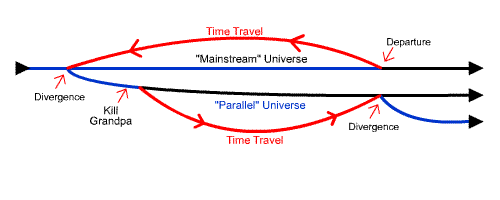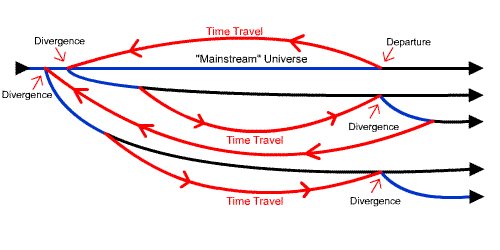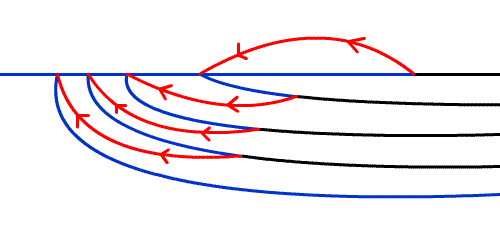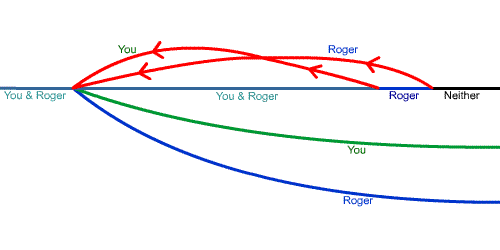Time Travel: This Time, It's Personal
One of the tropes of science fiction that really bugs me is time travel. Well, not time travel in and of itself, but rather the incoherently sloppy and self-inconsistent way it is often handled in mainstream science fiction, like pretty much any comic book or television show (lookin’ at you, Star Trek and Doctor Who).
There are basically three different categories of time travel in fiction:
- Immutable timeline:
In these types of time travel stories, it is impossible to change the past, present, or future. Every moment is set in stone. This type of timeline can be rife with fascinating paradoxes. Though you could NOT go back in time and enact a Grandfather Paradox (kill your grandfather before he conceived your father so that you would never have been born at all), because that obviously didn’t happen, your attempt to kill him could be what inspired him to go home and knock-up your grandmother that night. Stories set in Immutable Timelines are often used for irony; a character goes back in time to stop an event, but it turns out that he’s what caused it in the first place. Robert A. Heinlein took this to the absolute extreme in his short story “—All You Zombies—” in which the main character was born a woman, had a child, and then had a gender change. Well, it turns out that she had been impregnated by a future version of himself, and had actually given birth to herself. S/he is then recruited into the “Temporal Bureau” by himself. Such Immutable Timelines are fascinating to play with, and I’ve written two stories that take place in them, one of which involves a character seeing his own corpse before he’s been killed. - Mutable Timeline:
These are the stories where you can change something in the past and it changes the future. In these stories it is (usually) possible to enact a Grandfather Paradox. Often in order to avoid weird paradoxes, the time traveler is said to be “protected” somehow from the changes in the timeline, though not always. Sometimes if he is successful in killing his Grandfather he will simply cease to exist as his future is “wiped” from existence. These Mutable Timelines are some of my least favorite because they’re usually full of inconsistent rules and sometimes doing something in the past has some effects and sometimes others, and it’s all usually just a big mess. - Alternate/Parallel/Branch Timelines:
I find this a much more elegant and internally consistent version than #2. Basically, this posits that we all live on one, consistent, past-to-future timeline, which I’ll call the “mainstream” universe in this article. In this mainstream universe we all share the same past and will share the same future. When a time-traveler from this mainstream universe goes back into the past they actually create a split-off universe which diverges from the mainstream universe the instant the time-traveler appears in the past. It shares its history with the mainstream universe until the point of divergence; from then on it has its own future.
What really bothers me is when a work of fiction tries to set out “rules” for its time travel but then constantly violates them. The Back to the Future Movies are full of crappy time travel. Sometimes you can change the past like type #2. Sometimes events seem predestined like in type #1. Doc Brown even draws an illustration of type #3 on a chalkboard, but nowhere does this type of travel ever take place in any of the movies! Ugh. And don’t even get me started with Dr. Who’s wibbly-wobbly-timey-wimey crap. You know what that is? That’s just an excuse for LAZY-ASS WRITING. Gah! Also don’t even mention the glorious crap-hole that is all time travel in the Star Trek TV shows. Roar!
This article concerns type #3 time travel.
I’d better clarify something here: for the purposes of this article, I do not consider relativity effects to be time travel; if you get on a spaceship and fly around really fast for a few years and come back to Earth to discover a few decades have passed, that does not count as time travel because the intervening time was experienced by both you and the Earth, albeit at different rates. For the purposes of this essay, when I talk about traveling forward in time I’m talking about skipping the intervening time entirely; basically teleporting forward in time.
Let’s say in the year 2011 you develop the ability to teleport through time, whether via machine or superpower. It doesn’t matter. You begin in the mainstream universe. You decide (arbitrarily) to travel back in time 10 years. POOF You vanish from the mainstream universe’s present and POOF the instant you reappear in the past you have created a divergence point and a new universe sprouts from the mainstream universe. You now exist in this parallel universe.

This branch universe, being now unconnected from the mainstream universe, will have its own future from the point of divergence. In this way the Grandfather Paradox is completely avoided, because even if you kill your own grandfather before your father was born, you’re not changing anything that already happened in the mainstream universe; you’re creating the events of the new parallel universe.
Now say you DO end up killing your grandfather. You then want to travel forward to the point in time in 2011 when you left. Well, guess what? You’re going to be traveling forward in time in this branch universe, not the mainstream universe.
Now here’s an idea that I’ve never seen addressed in any type #3 time travel stories. When you go back in the past it is taken as a given that you create a divergence point. But why would that only happen if you went backwards in time? Shouldn’t you create a divergence no matter which direction in time you go? So when you do POOF appear back in 2011 you’ll create another point of divergence and start going down another branch universe. Like this:

See, you’re now two universes away from the mainstream universe you left. Let’s say you don’t like how this future turned out. “Well,” you think, “this sucks. How do I get back to the mainstream universe?”
Answer: you can’t.
But what if you go back in time to before the first divergence I created, then travel forward in time from there?
Well, you’d just travel back through the branch universes until you passed that original divergence, and then you’d be traveling back through the mainstream universe until POOF you appear and instantly create another branch universe that you now exist on. Travel forward in time from here and guess what? That’s right: you travel forward along this branch universe, and as soon as you POOF appear you create another branch universe.

Nobody living in the mainstream universe will ever get to meet a time traveler, either one from the future or past.
Likewise, the mainstream universe is gone from you FOREVER.*
You can do some very cool things with parallel timelines, including jumping around in time and collecting various versions of yourself and bringing them with you. You could go back in time, say, one minute, grab yourself and stuff you in the time machine, then go back in time another minute, grab that one, and so on and so on until you amassed an entire army comprised entirely of you.

In DC Comics’ miniseries “The Kingdom” there’s a character who kills Superman but finds that he is unsatisfied, so he goes back in time one day and kills him, and keeps repeating this day by day by day.
Now think about this from the point of view of the mainstream universe. Say you and your good buddy Roger were standing next to each other in the mainstream universe the first time you traveled through time. From Roger’s point of view you simply cease to exist from that moment on. He’ll never see you again. There might (depending on how far back you’ve gone) be a Roger on the branch universe you’ve created, but it is not the same Roger that you left.
But let’s say that Roger can also travel through time, and he decides to follow you. Less than a second after you disappear he also time-travels to the exact instant in the past that you did.
Well, sorry. As soon as POOF Roger appears, he creates his own divergence and goes down his own branch universe. Roger will never be able to find you. The two of you will be forever separated, and to those of us left in the mainstream universe you will be essentially non-existent.

Or will you?
Here’s another idea that I don’t recall ever having heard about in any science fiction stories: what if time travel doesn’t create one point of divergence? What if time travel creates two points of divergence: the first one at the moment of departure and the second at the moment of arrival?
Now let’s think through this. When you time travel, your departure creates a divergence from the mainstream universe: a branch universe in which you disappear and Roger will never see you again. But from the point of view of the mainstream universe you will have never left. In the mainstream universe, for whatever reason, your time travel power/machine does not work. The mainstream-universe-version of you still goes on with its daily existence, but will be forever barred from traveling through time.

So, sorry, none of us will ever meet a time traveler, or witness someone else time traveling. I believe that time travel is impossible in the mainstream universe... with the exception of you, personally. If anybody else around you tries to time travel, to you it will appear as if they’ve failed. But if you time travel, you can experience the whole thing, even though to those left behind it will appear as though you have failed.
So as it turns out, time travel might not be some epic, grandiose, sweeping saga. Time travel might be a very personal event, because you’re the only person who will ever experience it. And the same is true of every singe individual. From their point of view they will be traveling through time, but from anyone else’s point of view they will not.
Unless, of course, your time machine fits more than one person.
*The only way to get back to the Mainstream Universe would be if you found a way to directly teleport between parallel universes without using time travel. Right? I'm not so sure. How would your POOF appearance back in the mainstream universe using universe hopping be any different than your POOF appearance using time travel? Wouldn't it still create a divergence and shoot you down a new branch universe?
Interesting side-note: The 2009 Star Trek movie gets type #3 time travel almost right: when the Romulans go back in time they create an entirely new timeline that has its own future, without negating anything that happened on any of the old shows/movies (i.e., the Mainstream Universe). Unfortunately, Spock-Prime would have created his own branch universe when he popped out 60 years later than the Romulans... unless you consider the black hole to be one singular time-travel event on each end, only the past end happened really sloooowly -- like if two people went back in time in the same time machine but one of them just stayed inside of it longer than the other. The appearance of the time machine in the past would create the divergence point, so it wouldn’t matter if the chrononauts exited separately; they would still be stepping out into the same branch universe. So, yeah, I guess it works after all.